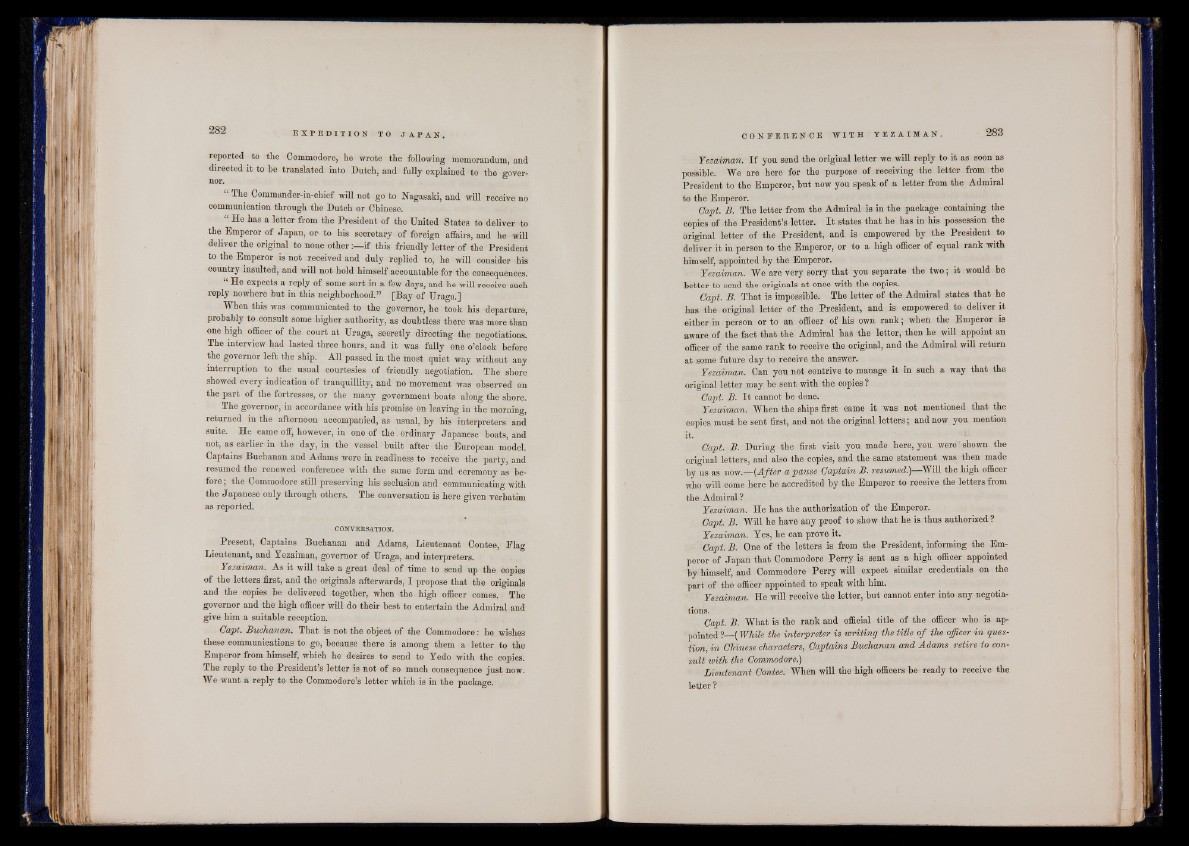
reported to the Commodore, he wrote the following memorandum, and
directed it to be translated into Dutch, and fully explained to the governor.
“ The Commander-in-chief will not go to Nagasaki, and will receive no
communication through the Dutch or Chinese.
“ He has a letter from the President of the United States to deliver to
the Emperor of Japan, or- to his secretary of foreign affairs, and he will
deliver the original to none o t h e r i f this friendly letter of the President
to the Emperor is not received and duly replied to, he will consider his
country insulted, and will not hold himself accountable for the consequences.
He expects a reply of some sort in a few days, and he will receive such
reply nowhere but in this neighborhood.” [Bay of Uraga.]!
When this was communicated to the governor, he took his departure,
probably to consult some higher authority, as doubtless there was more than
one high officer of the court at Uraga, secretly directing the negotiations.
The interview had lasted three hours, and it was fully one o’clock before
the governor left the ship. All passed in the most quiet way without any
interruption to the usual courtesies of friendly negotiation. The shore
showed every indication of tranquillity, and no movement was observed on
the part of the fortresses, or the many government boats along the shore.
The governor, in accordance with his promise on leaving in the morning,
returned in the afternoon accompanied, as usual, by his interpreters and
suite. He came off, however, in one of the . ordinary Japanese boats, and
not, as earlier in the day, in the vessel built after - the European model.
Captains Buchanan and Adams were in readiness to receive the party, and
resumed the renewed conference with the same form and ceremony as before;
the Commodore still preserving his seclusion and communicating with
the Japanese only through others. The conversation is here given verbatim
as reported.
C O N V E R SA T IO N .
Present, Captains Buchanan and Adams, Lieutenant Contee, Flag
Lieutenant, and Yezaiman, governor of Uraga, and interpreters.
Yezaiman. As it will take a great deal of time to send up the copies
of the letters first, and the originals afterwards, I propose that the originals
and the copies be delivered together, when the high officer comes. The
governor and the high officer will do their best to entertain the Admiral and
give him a suitable reception.
Capt. Buchanan. That is not the object of the Commodore" he wishes
these communications to go, because there is among them a letter to the
Emperor from himself, which he desires to send to Yedo with the copies.
The reply to the President’s letter is not of so much consequence just now.
We want a reply to the Commodore’s letter which is in the package.
Yezaiman. I f you send the original letter we will reply to it as soon as
possible. We are here for the purpose of receiving the letter from the
President to the Emperor, but now you speak of a letter from the Admiral
to the Emperor.
Capt. B. The letter from the Admiral is in the package containing the
copies of the President’s letter. I t states that he has in his possession the
original letter of the President, and is empowered by the President to
deliver it in person to the Emperor, or to a high officer of equal rank with
himself, appointed by the Emperor.
Yezaiman. We are very sorry that you separate the two; it would be
better to send the originals at once with the copies.
Gapi. B. That is impossible. The letter of the Admiral states that he
has the original letter of the President, and is empowered to deliver it
either in person or to an officer of his own rank; when the Emperor is
aware of the fact that the Admiral has the letter, then he will appoint an
officer of the same rank to receive the original, and the Admiral will return
at some future day to receive the answer.
Yezaiman. Can you not contrive to manage it in such a way that the
original letter may be sent with the copies ?
Capt. B. I t cannot be done.
Yezaiman. When the ships first came it was not mentioned that the
copies must be sent first, and not the original letters; and now you mention
it.
Capt. B. During the first visit you made here, you were1 shown the
original letters, and also the copies, and the same statement was then made
by us as now.—(After a pause Captain B. resumed.)—Will the high officer
who will come here be accredited by the Emperor to receive the letters from
the Admiral?
Yezaiman. He has the authorization of the Emperor.
Capt. B. Will he have any proof to show that he is thus authorized ?
Yezaiman. Yes, he can prove it.
Capt.B. One of the letters is from the President, informing the Emperor
of Japan that Commodore Perry is sent as a high officer appointed
by himself, and Commodore Perry will expect similar credentials on the
part of the officer appointed to speak with him.
Yezaiman. He will receive the letter, but cannot enter into any negotiar
tions.
Capt. B. What is the rank and official title of the officer who is appointed?—(
While the interpreter is writing the tide o f the officer in question,
in Chinese characters, Captains Buchanan and Adams retire to consult
with the Commodore.)
Lieutenant Contee. When will the high officers be ready to receive the
letter ?